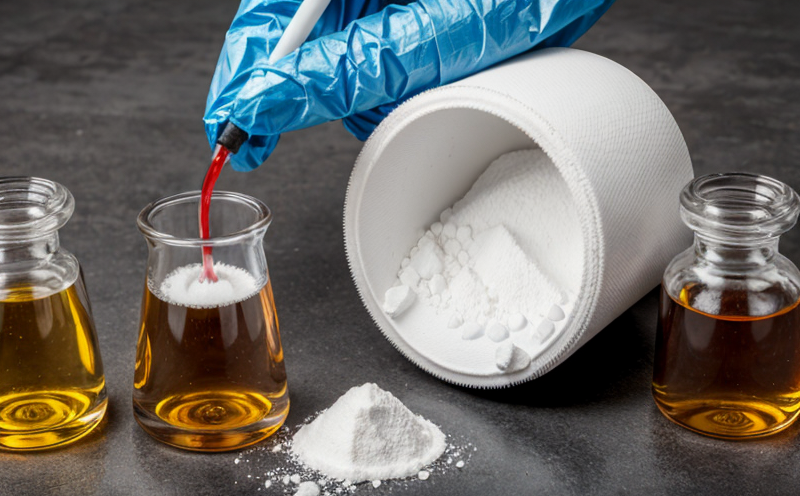EN 1122 Heavy Metal Testing in Polyvinyl Chloride PVC
The European standard EN 1122 is a critical document that sets out the requirements for heavy metal content limits in polyvinyl chloride (PVC) materials used in electrical and electronic equipment. This testing ensures compliance with stringent environmental regulations aimed at reducing harmful substances to protect human health and the environment.
PVC, being widely utilized in various applications such as cables, wires, insulation materials, and casings for electronics, must meet specific heavy metal content limits to avoid contamination of end products. The scope of EN 1122 is broad, encompassing a range of heavy metals including lead (Pb), cadmium (Cd), mercury (Hg), and hexavalent chromium (Cr(VI)). These elements are known for their toxic properties when present in excessive amounts.
The testing process involves the collection of PVC samples from various stages of production or use. The specimens undergo rigorous analysis to determine the presence and concentration levels of heavy metals, ensuring that they do not exceed the permissible limits set forth by EN 1122. Specimen preparation typically includes grinding the materials into fine particles for homogeneity in testing.
To conduct this testing effectively, our laboratory employs advanced analytical techniques such as Inductively Coupled Plasma Mass Spectrometry (ICP-MS) and Flame Atomic Absorption Spectroscopy (FAAS). These instruments provide accurate and precise results, ensuring that the test data aligns with international standards. The process involves dissolving the PVC samples in a suitable solvent before analysis to facilitate the detection of heavy metals.
The acceptance criteria for EN 1122 are stringent and strictly adhere to European regulations. Compliance is essential as non-compliance can result in product recalls, damage to brand reputation, and potential legal action. Our comprehensive testing services ensure that your products meet these stringent requirements, thereby safeguarding consumer health and ensuring regulatory compliance.
In real-world scenarios, this testing is crucial for quality managers and R&D engineers who need to ensure the safety of their end products. It also plays a vital role in the procurement process where suppliers must demonstrate adherence to environmental standards. By adhering to EN 1122, you can trust that your materials are safe and comply with global regulations.
The testing procedures for heavy metal content in PVC are detailed and involve several steps from sample collection to final analysis. Our laboratory strictly follows these protocols to ensure accurate and reliable results. This process is essential as it helps manufacturers identify potential issues early on, thus preventing costly product recalls and reputational damage.
Our commitment to accuracy extends beyond the testing process itself. We provide detailed reports that outline the findings of the heavy metal analysis, including the concentrations detected for each element. These reports are invaluable tools for quality control departments as they help in making informed decisions regarding production processes and material sourcing.
Benefits
- Ensures compliance with international standards such as EN 1122, reducing the risk of legal action.
- Protects consumer health by minimizing exposure to harmful heavy metals in everyday products.
- Enhances brand reputation through adherence to environmental regulations and best practices.
- Reduces operational costs associated with product recalls due to non-compliance or contamination issues.
Customer Impact and Satisfaction
The impact of EN 1122 heavy metal testing in PVC materials is profound for our customers. By providing accurate, reliable, and consistent test results, we ensure that their products are safe and compliant with global regulations. This not only enhances customer satisfaction but also builds trust within the industry.
Our testing services play a crucial role in helping customers meet regulatory requirements and avoid potential penalties associated with non-compliance. By offering these services, we enable our clients to focus on innovation and product development while ensuring that their products are safe for end-users.
The detailed reports generated from our tests provide valuable insights into the heavy metal content of PVC materials. This information is essential for quality assurance departments as they can use it to make informed decisions regarding production processes, material sourcing, and potential improvements in manufacturing techniques.
International Acceptance and Recognition
EN 1122 heavy metal testing in PVC materials is widely accepted and recognized across Europe and beyond. This standard is part of a broader framework aimed at reducing the use of hazardous substances in electronics and electrical equipment, aligning with international efforts to promote sustainability and environmental protection.
The recognition of this standard extends to various stakeholders within the industry, including manufacturers, suppliers, retailers, and regulatory bodies. By adhering to EN 1122, companies can demonstrate their commitment to environmental responsibility and contribute to a healthier planet for future generations.





